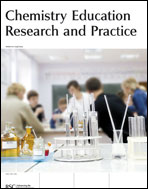Silent and vocal students in a large active learning chemistry classroom: Comparison of performance and motivational factors
Abstract
Active learning is becoming more prevalent in large science classrooms, and this study shows the impact on performance of being vocal during Socratic questioning in a General Chemistry course. 800 college students over a two year period were given a pre and post-test using the Chemistry Concept Reasoning Test. The pre-test results showed that there was no initial difference in conceptual understanding of chemistry among students who actively participated on a regular basis and those who did not. However, on the post-test those vocal students who consistently attempted to respond to questions in class showed significantly greater learning gains than those silent students who rarely or never tried to answer questions. The motivation for participating for many students was initially the minimal extra credit for answering questions. Once students started answering questions, they saw the educational value in getting feedback, enjoyed the engagement of the Socratic dialogue, and realized the benefit of putting chemistry concepts into words. Also tied to participation during class was the need to complete the reading assignments before class. Students who read prior to class were more able to participate and were then continually incentivized to stay current with the class readings. The active learning environment did benefit all students by providing cognitive and social dimensions during class, and those students who participated frequently learned more chemistry.

 Please wait while we load your content...
Please wait while we load your content...